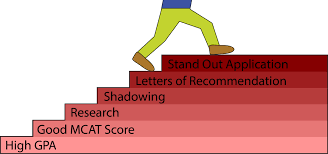MORE THAN JUST THE RIGHT NUMBERS

BY HAMZAH ALI –
 3.98 GPA, 518 MCAT Score, 150+ hours of clinical volunteering, 75+ hours of shadowing, president of a premier pre-medical club and five semesters of undergraduate research experience are the credentials of a student who was DENIED admissions to medical school. If you are a pre-med student reading this article right now, I am sure that your blood pressure is rising and stress level is at an all-time high. Nonetheless, take a deep breath because getting into medical school requires more than just the right numbers. As a pre-med student myself, I have always turned to peers for advice on what medical schools seek in their applicants. We tend to overlook the most reliable resource available: medical school admissions committee members.
3.98 GPA, 518 MCAT Score, 150+ hours of clinical volunteering, 75+ hours of shadowing, president of a premier pre-medical club and five semesters of undergraduate research experience are the credentials of a student who was DENIED admissions to medical school. If you are a pre-med student reading this article right now, I am sure that your blood pressure is rising and stress level is at an all-time high. Nonetheless, take a deep breath because getting into medical school requires more than just the right numbers. As a pre-med student myself, I have always turned to peers for advice on what medical schools seek in their applicants. We tend to overlook the most reliable resource available: medical school admissions committee members.
This article provides two very credible perspectives on medical school admissions. The Campus Associate Dean for Campus Integration and Academic Enhancement, Dr. Leslie Lee, and Associate Professor of Medicine, Dr. Howard Cohen have been on the admissions committee at the AU/UGA Medical Partnership for many years and have excellent advice for prospective medical students.
Premed students often struggle to balance commitment to healthcare and also show diversity in their interests. Dr. Lee states that students should show an awareness of current healthcare issues and pursue interests that they have a strong passion for. An example of this would be volunteering consistently with Habitat for Humanity while also keeping up to date with conflicts between the Affordable Care Act and the American Health Care Act. The key is to be able to show that you are an active citizen and a dedicated, lifelong learner.
Another question that pre-med students ponder over is what attributes medical schools look for in their applicants. Dr. Cohen looks for two fundamental characteristics in applicants: at the forefront is a commitment to serve humanity and the other a desire for a long term career in medicine. It is important to shadow physicians in clinical and hospital settings to understand the degree of commitment that healthcare requires. In addition, Dr. Lee looks for humility, compassion and intellectual curiosity in applicants. Pre-med students are by far one of the most academically inclined groups of students on campus. Unfortunately, one quality that this group often times lacks is humility. It is important to know that while you may know a lot and have earned high achievements, there is still a long road ahead with more to learn and many levels to keep climbing.
Whether a student is in their first year or last year of their undergraduate degree, they are both stressing over getting into medical school. However, underclassmen should not be worried over this goal. Dr. Lee and Dr. Cohen both agree that college is a time to explore your passions and discover new talents. They encourage you to take courses unknown to you and to not put blinders on with preconceived notions. A student who has explored his/her options before finalizing upon medicine will have a breadth of experiences that they can expound upon in an interview. Dr. Lee states, “Put yourself out there and create life stories that you can talk about.” For upperclassmen getting ready to apply to medical school, do not shy away from considering gap years. If you can take time off, do so and pursue dreams that you could not otherwise if you were in medical school. This time will not come back again, so do not let it go. Do not feel pressured by what others are doing.
If you take away anything from this article, it should be that the road to medical school is not a “one size fits all” ordeal. It is a process where you are allowed to develop yourself into a unique individual and show the world that you are more than just the right numbers.
